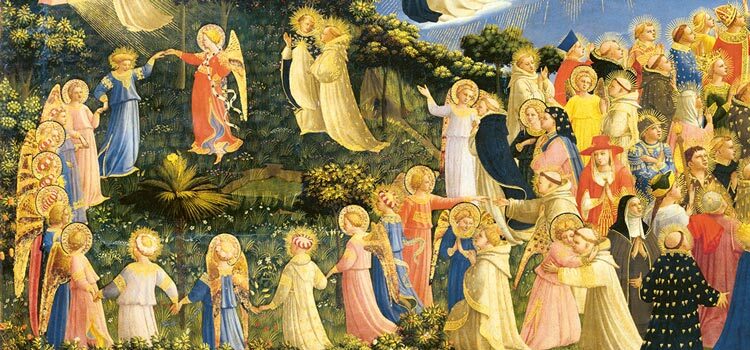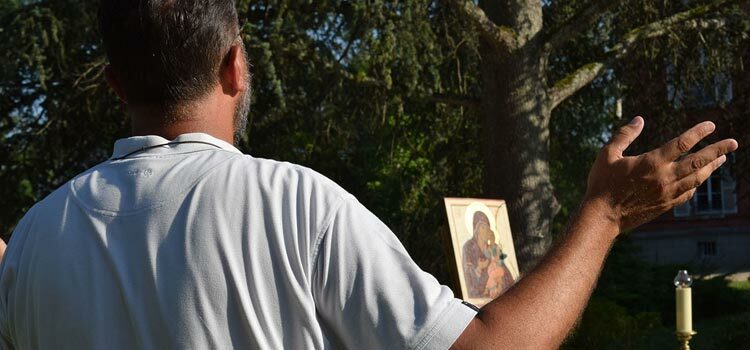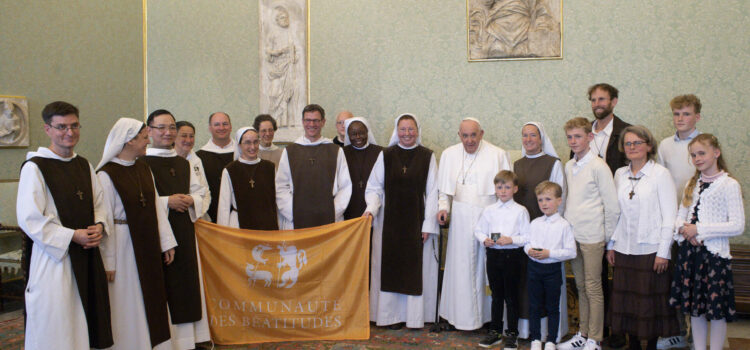« In our daily timetable, an adequate time will be consecrated to « Lectio Divina » in order to be enlightened, fed and molded by the Word of God. » (SG n° 34)
Our founders, who originally were Protestant, have handed down to us a love of the Word of God right from the beginning of the Community. We listen to it, we sing it during Mass, during the services and during our evening prayers. A Word we asked the Lord for and received during Vespers, remained with us (and still does) during our daily life. What more does Lectio Divina bring to us?
Let us listen to Benedict XVI’s answer to this question : « Above all I would like to recall and recommend the ancient tradition of Lectio Divina : an assiduous reading of the Holy Scriptures, along with prayer, achieves the intimate dialogue by which, as we read, we listen to God who speaks, and as we pray, we respond to Him with trust. I am convinced that this practice, if promoted effectively, will bring to the Church a new spiritual spring » Would we not desire this « spring » for each one of us and for everybody? Let us look now at the fruits of Lectio Divina as shown in our Statutes (n° 34).
Through Lectio Divina, we are in touch with the One who speaks about Himself as the « light of the world. »
Listening carefully, questioning the Word we have received, praying on it, we get to know our Lord’s heart better and the way He wants to reveal Himself to us. Little by little, we also get to know ourselves and the human heart better.
The Word we receive more deeply during Lectio, is going to enlighten our thoughts and daily behavior. It will help us in the small and great choices we have to make and help us to behave as « children of the light ». It will become, more and more, « a light guiding our steps. »
Food
« Alive, effective and cutting » it will help us sort out in ourselves, what is worthy of Jesus’s disciple or what isn’t.
The Word of God has been quite often compared to vital food for man. Jesus, recalling a word addressed to Israel in the desert (cf. Deut.8,3), mentions it clearly in his own warfare in the desert « Man shall not live by bread alone, but by every word that proceeds from the mouth of God » (Matt. 4,4) The early Fathers speak about « chewing » and « ruminating »the Word.
A renewal
The word of « manducation » is also used. It means time is taken to repeat, turn over a verse in our mouth, to help it descend to our memory and our heart: it will be enriched and transformed. Saint Bernard underlines the « delight » of this process: « I ruminate these things with sweetness, all my being is filled with joy, everything in me is feasting and from my body springs forth praise. »
This requires sitting down for a while and meditating on the Word: at least as long as a real meal!
As we proceed with Lectio Divina, this « descent » of the Word in our heart is going to lead us into prayer and an encounter with the Lord. It can also feed our time of adoration if contemplation is not spontaneously given to us.
The Word of God is creative, as shown in the whole Bible « You spoke, Lord, and they were made, You sent forth your Spirit, and they were created. » (Jdt.16, 14). Jesus, the Word made flesh, with one brief word, has Lazarus, who had been dead for four days, coming out of his grave. Only one of His words, received with faith and full attention, would certainly raise and re-create us. But we are aware that, in the midst of all the words we hear and utter, hearing only once: « Arise, shine, for thy light has come » is generally not enough for this word to reach us and be able to give us all the « life » hidden in it. We need to slow down our usual reading rhythm so that we receive the Word like a small « seed » of life. We need to give it time, meditate, question it, let it become a prayer, so that it grows deep roots in our memory, then in our behavior. We have also to look out so that « brambles and thorns » do not choke it and do not prevent it from growing mature.
In giving it enough time every day, we shall see the Word – softly but also vigorously at times – working in us and giving us our true identity of sons and daughters of the Father.
Thus, meditation can renew our heart as father Matta El Maskine explains in «Experimenting God in a life of prayer »: «One observes that a heartfelt perseverance in the meditation of the Scriptures, always leads to an infusion of true life in one’s heart ; for the Word of God, as defined by the Lord, is Spirit and Life (…)The meditation of God’s Law keeps the heart alive, warmed by the fire of the divine Word, because meditation basically includes a permanent entering more deeply into the spirit of the Scriptures and searching the hidden truths behind the commandment. As a result, man’s thoughts are always renewed, his sensitivity is refined, rendered more « evangelical », leading him to a flexible and easy behavior, positively open to all eventualities».
If we persevere with Lectio Divina, we shall receive even more treasures: « For in the sacred books, the Father who is in heaven meets His children with great love and speaks with them; and the force and power in the word of God is so great that it stands as the support and energy of the Church, the strength of faith for her sons, the food of the soul, the pure and everlasting source of spiritual life. » (Dei Verbum n° 21)
In the next « Il est là » we shall consider the question « Lectio Divina: how ? »
The Quotation
«Anyone who loves me will keep my word, and my father will love him; we will come to him and make our home with him.» Jesus (Gv. 14, 23)
To go further…Just for today:
Books:
|
Find the previous articles in our “Life of prayer” series.
(publication edited by brothers and sisters of the Community of the Beatitudes – © rights reserved).






